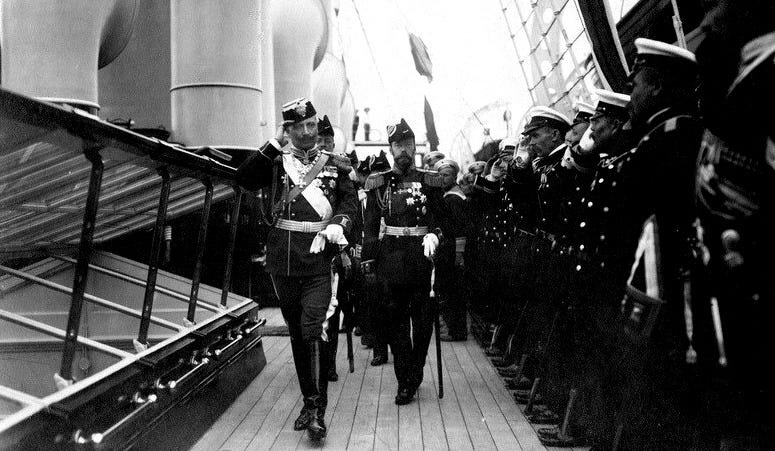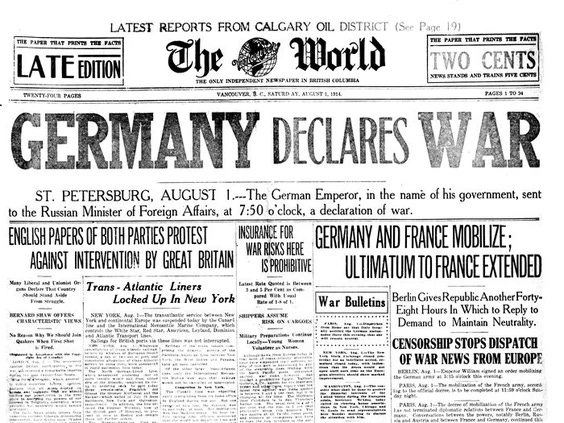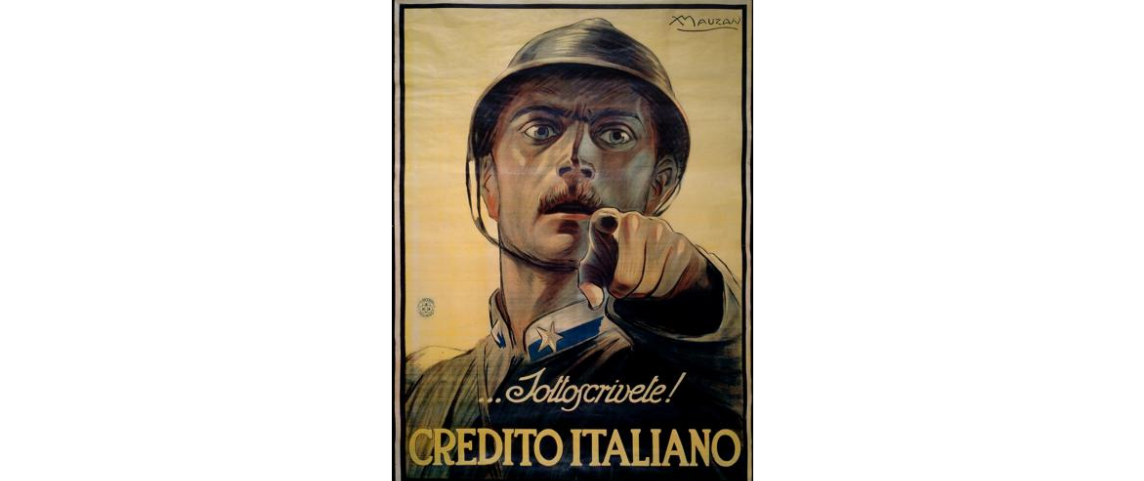Long-Time Pen Pals
Kaiser Wilhelm II and Tsar Nicholas II were both second and third cousins, bound by a complicated family web(they were also first cousins of George V of Britain). Although with lacking evidence, It is said they weren’t fond of each other. Still, both showed a lot of intimacy and cordiality as evidenced on the letters I’ll present. Firstly, here are some fragments of a telegram from the Kaiser to the Tsar after the passing of his father, Alexander III:
Potsdam, 8th of November of 1894:
My dear Nicky,
“The heavy and responsible task for which Providence had destined you has come upon you with the suddenness of a surprise, through the so unexpected and untimely death of your dear lamented father. These lines are to express my fullest and warmest sympathy with you and your Alix. And your poor distressed mother.(…)May Heaven comfort you in your grief and give you strength for your heavy duties, and may a long and peaceful reign give you the opportunity of looking after the welfare of your subjects.(…)”
Your most devoted friend and cousin
-Wilhelm
The first telegrams were released in 1918 by American journalist Herman Bernstein during his stay in St. Petersburg, consisting of messages sent back and forth between the emperors during the 1904-1907 period. From trying to improve their countries relationship and leaking secret information, to talks about hunting and the weather. The following are two interesting instances during the Russo-Japanese war:
Saint Petersburg, October of 1904:
“Having been out shooting I could not answer your interesting telegram earlier. Many thanks for the information about Japan's activity in some European countries. I heard about it also, but I cannot quite make out whether the strings of these doings lead across the Channel, or perhaps the Atlantic. You may be sure that Russia shall fight this war to the end, until the last Jap is driven out of Manchuria. Only then can come the talk about peace negotiations, and that solely between the two belligerents. May God help us. Hearty thanks for your loyal friendship, which I trust beyond anything.”
-Nicky
Berlin, September of 1905:
“Cablegrams from Washington brought me news of the agreement of the conference on preliminaries of peace, by which the final conclusion of peace is, it seems, at last guaranteed. May I express my most heartful compliments that a solution has been found which enables Russia to emerge with full honour out of the war and which pays tribute in every respect to the gallantry of your army as your constancy in vindicating Russia's rights and national honour. I hear Japan has conceded all your demands. President Roosevelt, I hear, has made nearly superhuman efforts to induce Japan to give away. He has really done a great work for your country and the whole world. The more so as I heard from him that England positively refused to budge a finger to help him in working upon their allies, the Japanese, to give away to his demands. Once more sincerest compliment. I am glad if I have been able to be of any use to you in this time. Best love to Alix.”
-Willy
A Reunion Attempt
Nyland, July 1905:
“Most obliged. Expect to arrive on the 23rd, at 7, evening. Please let your pilot meet us off Hochland. Nobody has the slightest idea of the meeting; only my captain, who is ordered to keep absolute secrecy. All my guests are under the impression of going to Visby, in Gothland. Am overjoyed at seeing you again. Have most important news for you. The faces of my guests will be worth seeing when they suddenly behold your yacht. A fine lark. Tableaux. Which dress for the meeting?”
-Willy
German-Russian military relations had been cold since 1890 with the end of the Reinsurance Treaty and the formation of the Franco-Russian Alliance a year after. Unexpectedly, on July of 1905 a secret defensive treaty was signed between the two countries. The plan was an initiative of Whilhelm, trying to exploit the Anglo-Russian tensions caused by the Russo-Japanese war. The treaty of Björkö, as it became known, was not accepted by both governments as almost no one was clarified beforehand, nor agreed to it, considering the countries already diverging alliances, rendering the deal to nothing.
“We joined hands and signed before God, who heard our vows!... What is signed, is signed! and God is our testator! - The Kaiser
Imminence of War
Later in 1920, Isaac Don Levine published the whole translated version of the telegrams between the two emperors, including the day after Austria-Hungary’s declaration of war on Serbia. The dialogue shows their wish to avoid the conflict but to do it so in their own terms, proving a faint cooperation. In adittion, both seem to push responsibility to the other side, leaning heavily on their shared-paths. It is also important to note that there were other players behind the scenes that added to such fast chain of events.
Saint Petersburg, 29th of July of 1914:
“I Am glad you are back. In this serious moment, I appeal to you to help me. An ignoble war has been declared to a weak country. The indignation in Russia shared fully by me is enormous. I foresee that very soon I shall be overwhelmed by the pressure forced upon me and be forced to take extreme measures which will lead to war. To try and avoid such a calamity as a European war I beg you in the name of our old friendship to do what you can to stop your allies from going too far.”
-Nicky
Berlin, 29th of July 1914(This and the previous telegraph crossed):
“It is with the gravest concern that I hear of the impression which the action of Austria against Serbia is creating in your country. The unscrupulous agitation that has been going on in Serbia for years has resulted in the outrageous crime, to which Archduke Francis Ferdinand fell a victim. The spirit that led Serbians to murder their own king and his wife still dominates the country. You will doubtless agree with me that we both, you and me, have a common interest as well as all sovereigns to insist that all the persons morally responsible for the dastardly murder should receive their deserved punishment. In this case politics plays no part at all.”
“On the other hand, I fully understand how difficult it is for you and your Government to face the drift of your public opinion. Therefore, with regard to the hearty and tender friendship which binds us both from long ago with firm ties, I am exerting my utmost influence to induce the Austrians to deal straightly to arrive to a satisfactory understanding with you. I confidently hope that you will help me in my efforts to smooth over difficulties that may still arise.”
Your very sincere and devoted friend and cousin
-Willy
Berlin, 29th of July 1914:
“I received your telegram and share your wish that peace should be maintained. But as I told you in my first telegram, I cannot consider Austria's action against Servia an "ignoble" war. Austria knows by experience that Serbian promises on paper are wholly unreliable. I understand its action must be judged as trending to get full guarantee that the Serbian promises shall become real facts. This my reasoning is borne out by the statement of the Austrian cabinet that Austria does not want to make any territorial conquests at the expense of Serbia. I therefore suggest that it would be quite possible for Russia to remain a spectator of the austro-serbian conflict without involving Europe in the most horrible war she ever witnessed. I think a direct understanding between your Government and Vienna possible and desirable, and as I already telegraphed to you, my Government is continuing its exercises to promote it. Of course military measures on the part of Russia would be looked upon by Austria as a calamity we both wish to avoid and jeopardize my position as mediator which I readily accepted on your appeal to my friendship and my help.”
-Willy
Saint Petersburg, 29th of July of 1914:
“Thanks for your telegram conciliatory and friendly. Whereas official message presented today by your ambassador to my minister was conveyed in a very different tone. Beg you to explain this divergency! It would be right to give over the austro-serbian problem to the Hague conference. Trust in your wisdom and friendship.”
-Your loving Nicky
Saint Petersburg, 30th of July of 1914:
“Thank you heartily for your quick answer. Am sending Tatischev this evening with instructions. The military measures which have now come into force were decided five days ago for reasons of defence on account of Austria's preparations. I hope from all my heart that these measures won't in any way interfere with your part as mediator which I greatly value. We need your strong pressure on Austria to come to an understanding with us.”
-Nicky
Berlin, 30th of July 1914:
“Best thanks for telegram. It is quite out of the question that my ambassadors language could have been in contradiction with the tenor of my telegram. Count Pourtalès was instructed to draw the attention of your government to the danger & grave consequences involved by a mobilisation; I said the same in my telegram to you. Austria has only mobilized against Serbia and only a part of her army. If, as it is now the case, according to the communication by you and your Government, Russia mobilises against Austria, my role as mediator you kindly intrusted me with, and which I accepted at your express prayer, will be endangered if not ruined. The whole weight of the decision lies solely on your shoulders now, who have to bear the responsibility for Peace or War.”
-Willy
Berlin, 31st of July 1914:
“On your appeal to my friendship and your call for assistance began to mediate between your and the Austro-Hungarian Government. While this action was proceeding your troops were mobilised against Austro-Hungary, my ally. thereby, as I have already pointed out to you, my mediation has been made almost illusory.”
“I have nevertheless continued my action. I now receive authentic news of serious preparations for war on my Eastern frontier. Responsibility for the safety of my empire forces preventive measures of defence upon me. In my endeavours to maintain the peace of the world I have gone to the utmost limit possible. The responsibility for the disaster which is now threatening the whole civilized world will not be laid at my door. In this moment it still lies in your power to avert it. Nobody is threatening the honour or power of Russia who can well afford to await the result of my mediation. My friendship for you and your empire, transmitted to me by my grandfather on his deathbed has always been sacred to me and I have honestly often backed up Russia when she was in serious trouble especially in her last war.”
“The peace of Europe may still be maintained by you, if Russia will agree to stop the military measures which must threaten Germany and Austria-Hungary.”
-Willy
Saint Petersburg, 31st of July of 1914:
“I thank you heartily for your mediation which begins to give one hope that all may yet end peacefully. It is technically impossible to stop our military preparations which were obligatory owing to Austria's mobilisation. We are far from wishing war. As long as the negociations with Austria on Serbia's account are taking place my troops shall not make any provocative action. I give you my solemn word for this. I put all my trust in Gods mercy and hope in your successful mediation in Vienna for the welfare of our countries and for the peace of Europe.”
-Your affectionate Nicky
Saint Petersburg, 1st of August of 1914:
“I received your telegram. I understand you are obliged to mobilise but wish to have the same guarantee from you as I gave you, that these measures do not mean war and that we shall continue negotiating for the benefit of our countries and universal peace deal to all our hearts. Our long proved friendship must succeed, with God's help, in avoiding bloodshed. Anxiously, full of confidence, I await your answer.”
-Nicky
Berlin, 1st of August of 1914:
“Thanks for your telegram. I yesterday pointed out to your government the way by which alone war may be avoided. Although I requested an answer for noon today, no telegram from my ambassador conveying an answer from your Government has reached me as yet. I therefore have been obliged to mobilise my army.”
“Immediate affirmative clear and unmistakable answer from your government is the only way to avoid endless misery. Until I have received this answer alas, I am unable to discuss the subject of your telegram. As a matter of fact I must request you to immediatly order your troops on no account to commit the slightest act of trespassing over our frontiers.”
-Willy
Sources of the Telegrams:
- The Willy-Nicky correspondence, being the secret and intimate telegrams exchanged between the Kaiser and the Tsar by Hermann Bernstein;
- The Kaiser's letters to the Tsar, copied from the government archives in Petrograd, and brought from Russia by Isaac Don Levine.


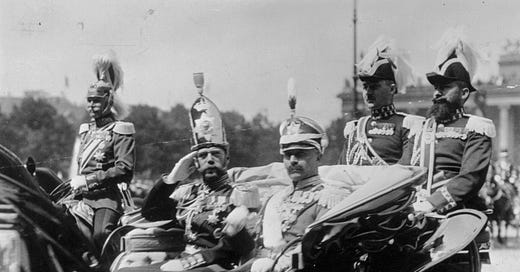



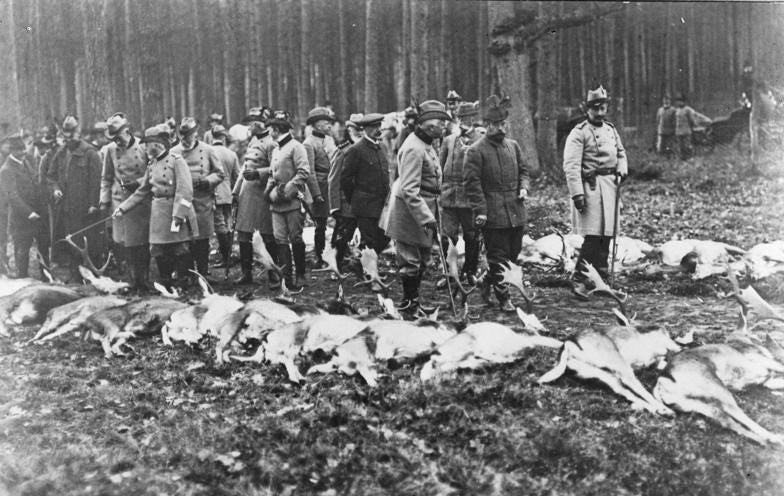
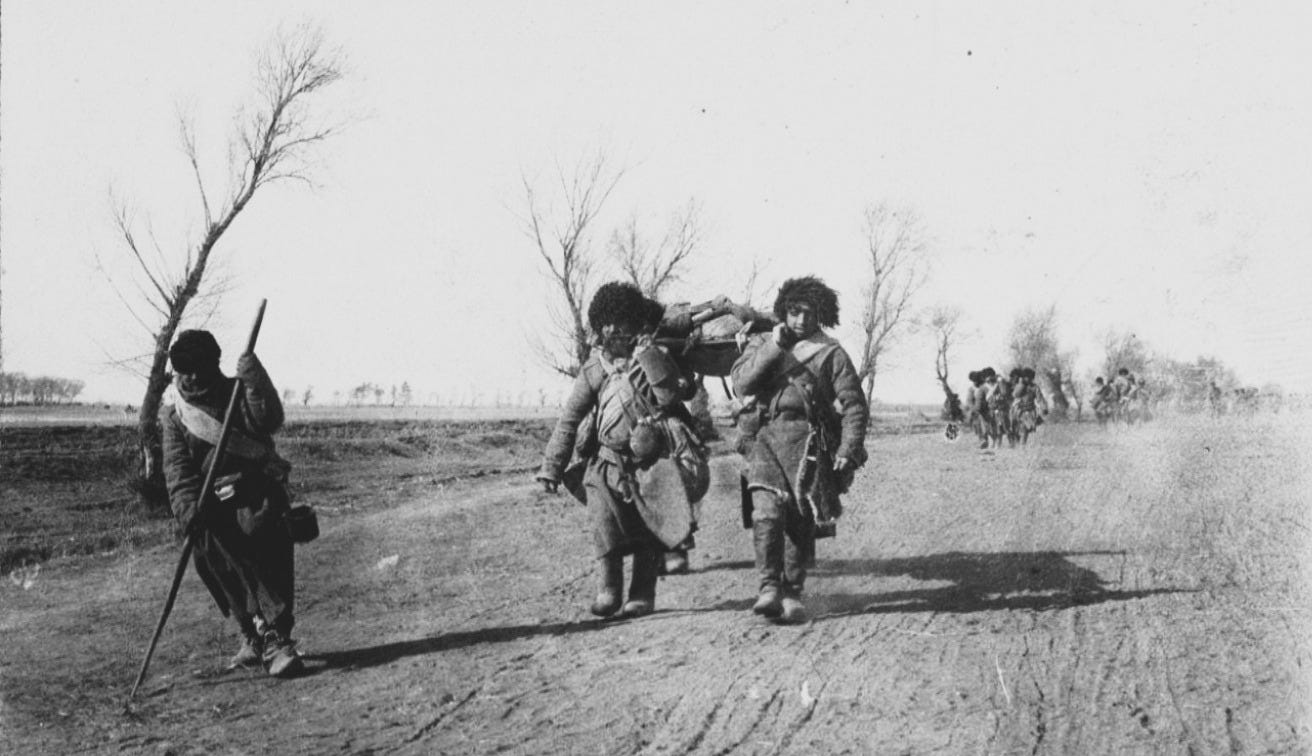
![r/HistoryPorn - Tsar Nicholas II. with his cousin Kaiser Wilhelm II. on a ship 1905 [1024x720] r/HistoryPorn - Tsar Nicholas II. with his cousin Kaiser Wilhelm II. on a ship 1905 [1024x720]](https://substackcdn.com/image/fetch/w_1456,c_limit,f_auto,q_auto:good,fl_progressive:steep/https%3A%2F%2Fsubstack-post-media.s3.amazonaws.com%2Fpublic%2Fimages%2F2dc956d7-41d0-48a0-8ace-f27da5c53e0e_1024x720.jpeg)
